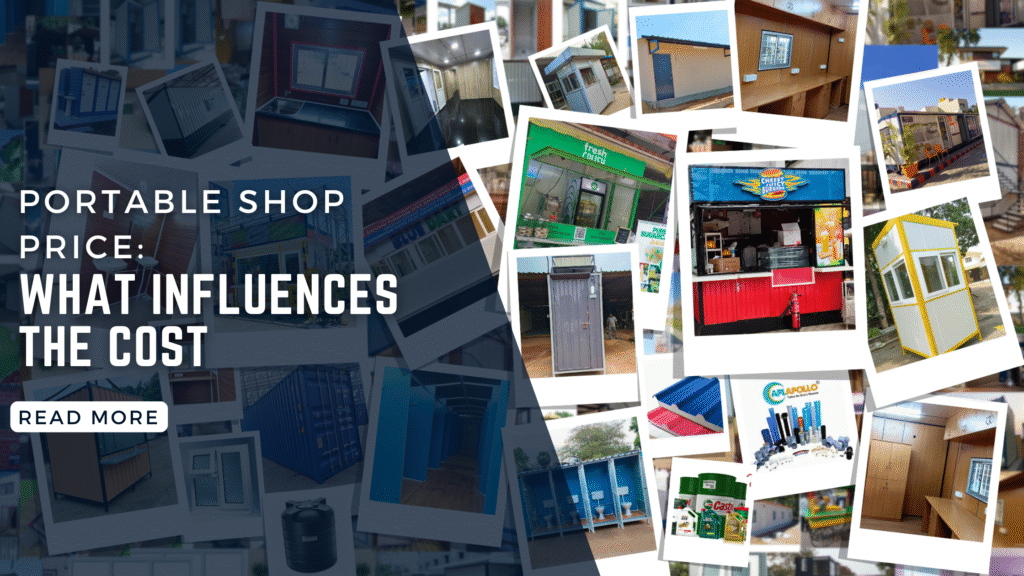
For entrepreneurs and business owners eyeing a portable shop, understanding pricing is crucial for budgeting and planning. Portable shops—ranging from kiosks and modular cabins to container stores—offer flexible, quick-to-launch retail solutions. Yet, their price tags vary widely. What exactly drives these costs, and how can you get the best value for your investment?
This post breaks down the key factors influencing portable shop prices, offers real-world price ranges, and shares tips to help you maximize your budget.
Key Factors That Influence Portable Shop Prices
1. Type and Size of Shop
- Kiosks: Smallest option (6×6 ft or similar), suitable for areas like malls or fairs. They’re usually the most affordable option.
- Cabin-Style Shops: Mid-sized (e.g., 10×10 ft up to 12×15 ft), built with prefabricated panels or frames—provide more space and customization.
- Container Shops: Made from refurbished shipping containers (typically 20ft or 40ft); durable and spacious, but pricier due to robust materials and finishing.
Larger and more complex shops naturally cost more due to materials, labor, and transportation.
2. Materials Used
- Steel: Strong, weather-resistant, ideal for long-term and outdoor use. Costs more upfront.
- Wood or Plywood: Lower cost, but less durable and may need extra treatment for weatherproofing.
- Composite or Eco-Friendly Panels: Can be cost-effective and sustainable, with prices depending on quality.
- Glass & Premium Finishes: For luxury or high-visibility brands, these add to the overall price.
3. Level of Customization
- Standard Units: Basic office/shop setups with minimal branding.
- Custom Layouts: Companies can add brand colors, signage, special windows/doors, display shelves, counters, and lighting—all of which increase price.
- Special Features: AC or ventilation, LED lighting, CCTV, display systems, or pop-up canopies add to the base cost.
4. Installation & Transportation
- Location Distance: Delivery costs rise if your site is far from the manufacturer.
- Setup Requirements: Installation on uneven or remote land, or inclusion of fittings like stairs/ramps, may add to expenses.
5. Utility Connections & Approvals
- Electrical, Water, and Plumbing Fixtures: Depending on your business (especially for F&B), these utilities must be installed and inspected, impacting cost.
- Certification & Permits: For food-related or public spaces, FSSAI and fire safety certifications can add minor fees.
6. Manufacturer/Brand Reputation
- Premium brands or established manufacturers may charge more, but offer better warranty, after-sales support, and build quality.
Typical Price Ranges (India Example)
| Type of Portable Shop | Approx. Price (₹) | Average Setup Time |
| Small Kiosk (6×6 ft) | 60,000–1,20,000 | 30 days |
| Medium Cabin (10×10 ft) | 1,50,000–3,00,000 | 30 days |
| Container Shop (20 ft) | 3,50,000–7,00,000 | 30 days |
These are guide prices; actual costs can vary based on materials, customizations, and city/state.
Tips to Get the Best Price
- Define Your Needs: Don’t over-order. Specify exactly what size, material, and extras you really require.
- Ask for Itemized Quotes: Break out structure, finishing, branding, transportation, and utility fittings.
- Compare Manufacturers: Balance cost against after-sales service and reputation.
- Plan for the Future: Select modular designs that allow for easy expansion if business grows.
- Watch for Promotions: Some makers offer off-season or launch discounts.
Frequently Asked Questions
Q: Can I get a portable shop on a tight budget?
A: Yes! Basic kiosks or lightweight prefab shops start around ₹60,000–₹1,00,000, especially if you opt for standard designs.
Q: Is it worth investing in customizations or premium materials?
A: For brands relying on strong visual impact, investing in durable and visually appealing materials pays off through customer trust and longevity.
Q: What additional costs should I anticipate?
A: Utility connections, signage, permits, and delivery are common “extras” to include in your budget.
Q: Do prices include GST and installation?
A: Always confirm with the supplier. Some quotes include taxes and setup, others don’t.
Final Thoughts
The price of a portable shop is influenced by size, materials, customization, and location logistics. By weighing your business needs against these factors, you can find a portable shop solution that fits your goals and budget perfectly. Smart planning and clear communication with your supplier will ensure you get the most value—so your retail venture hits the ground running with style and efficiency.
